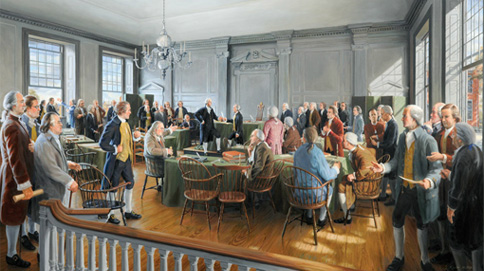A Founder Gives Us a Lesson on the Constitution’s Amendment Process
By Prof Rob Natelson April 19, 2017
Among the best tools for interpreting the Constitution are public explanations by its advocates made during the ratification fight. These explanations helped shape how the public understood the Constitution. They reassured the public about what the Constitution did NOT mean.
Those statements were at the heart of the ratification deal.
One reason the Federalist Papers are so useful because they were exactly this sort of literature. But they are tough going for many readers, both now and then. That helps explain why the more readable essays of Tench Coxe likely had as much influence with the common people as The Federalist.
So when Coxe explains what the Constitution means, we must attend respectfully.
Here is Tench Coxe writing about the Article V amendment process. This passage comes from an op-ed in the Pennsylvania Gazette of June 11, 1788:
The sovereign power of altering and amending the constitution . . . does not lie with this foederal legislature, whom some have erroneously apprehended to be supreme—That power, which is truly and evidently the real point of sovereignty, is vested in the several legislatures and [ratifying] conventions of the states, chosen by the people respectively within them. The foederal government cannot alter the constitution, but the representative bodies of the states, that is, their legislatures and conventions, only can execute these acts of sovereign power.
From the foregoing circumstances results another reflection equally satisfactory and important, which is, that as the foederal legislature . . . cannot prevent such wholesome alterations and amendments as are now desired, or which experience may hereafter suggest. . . . If two thirds of those legislatures require it, Congress must call a general convention, even though they dislike the proposed amendments, and if three fourths of the state legislatures or conventions approve such amendments, they become an actual and binding part of the constitution, without any possible interference of Congress.
This statement is a very fat one, but here’s its skeleton:
- Some people are claiming that under the Constitution, Congress will hold supreme power.
- But real supremacy belongs to those who can amend the Constitution.
- The Constitution puts that power in the hands of the state legislatures and state ratifying conventions—the “representative bodies of the states.”
- Congress cannot alter the Constitution.
- And Congress cannot block amendments it doesn’t like—by, for example, refusing to call an amendments convention that two thirds of the state legislatures want.
Let’s look at some of the wider implications:
* Congress can’t pass amendments alone. This argues against claims that Congress can gerrymander the membership of a “convention for proposing amendments,” change deadlines in midstream, or otherwise dominate the amendment process.
* By contrast, state legislatures and state conventions can amend the Constitution any time they want, and Congress can’t block them. This necessarily means that only state legislatures control the convention for proposing amendments. It means they can limit the scope of their applications, of the call, and of the convention. And it means they can choose and instruct their commissioners as they wish.
* This power to amend is in the “representative bodies of the states.” When a state legislature or state convention operates under Article V, it acts as a direct representative of the people, not as an arm of state government. Thus, Coxe’s article tends to support modern case law and undercut claims that state governments can direct or change the amendment process through laws and compacts.

